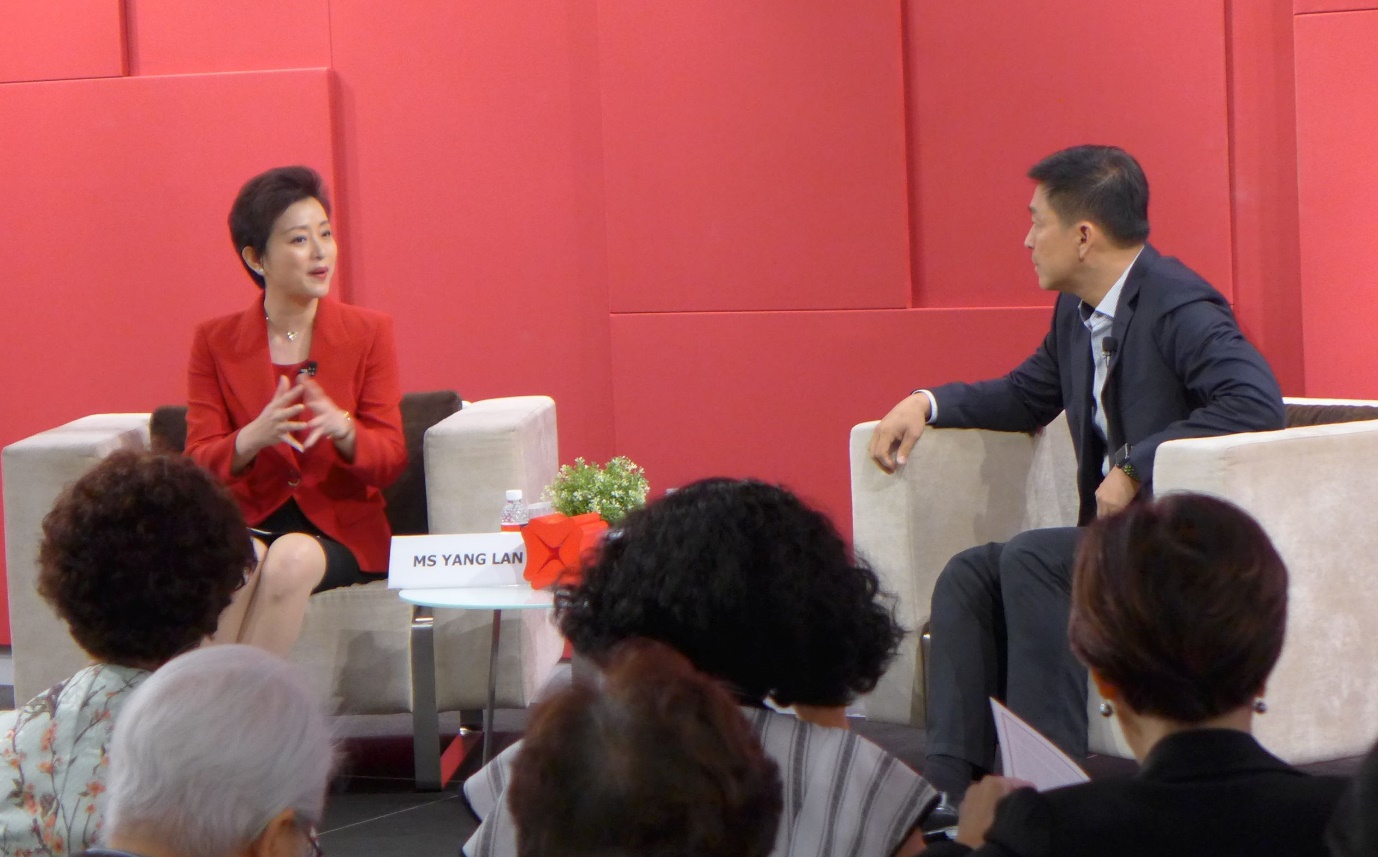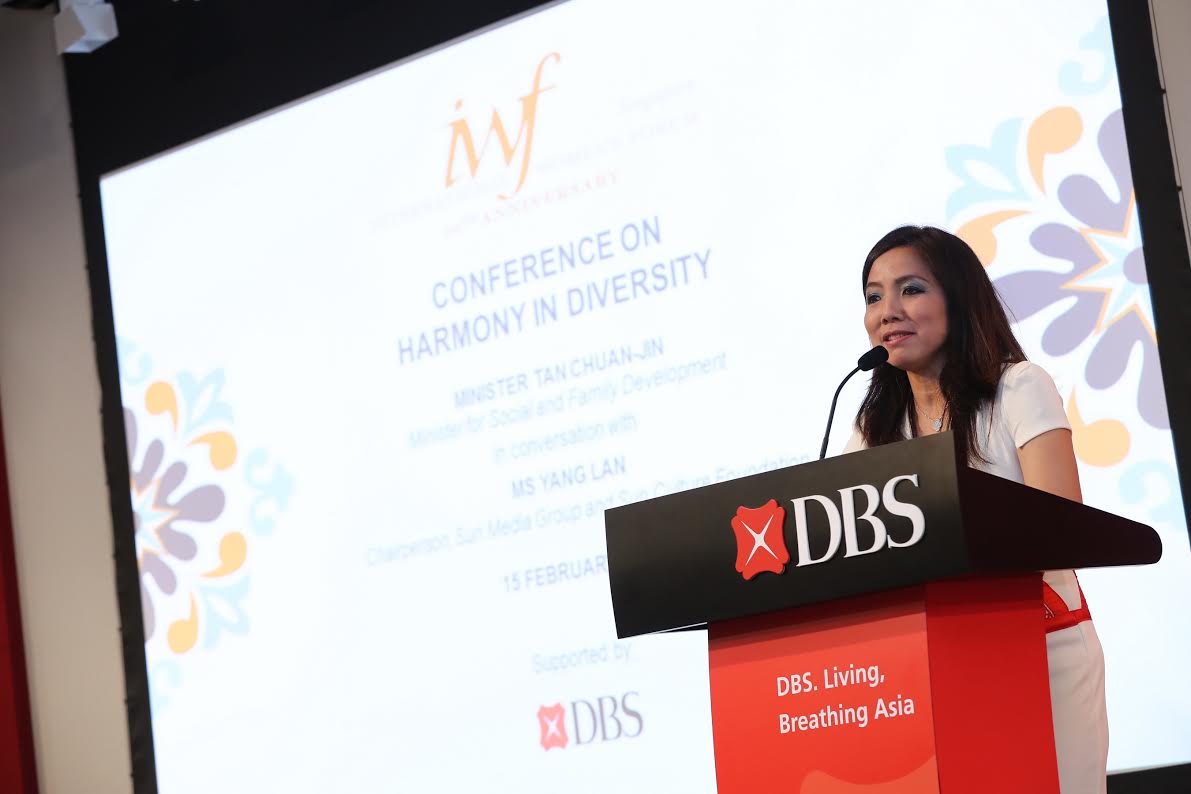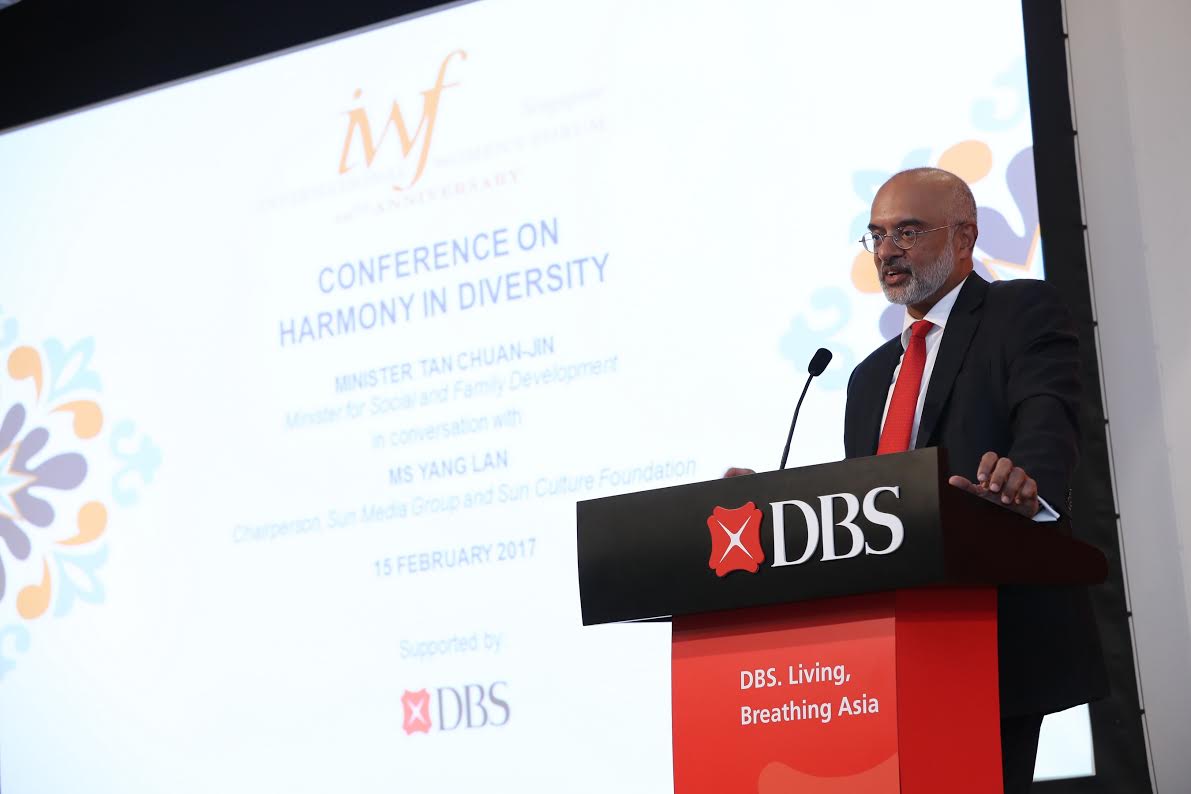Ms Yang Lan of Sun Media Group interviewing Minister for Social and Family Development, Tan Chuan Jin
Are women being fairly treated here in Singapore? How could we ensure a fairer spread of responsibilities and opportunities between the sexes?
These weighty issues were given a hearing last week at the Conference on Harmony in Diversity by the International Women’s Forum supported by DBS Bank.
Held in celebration of International Women’s Day, it attracted a stellar audience comprising some of the leading power women in Singapore. They included Ms Claire Chiang of Banyan Tree Holdings, as well as various head honchos here.
Ms Tan Su Shan of DBS (courtesy of DBS)
The session was opened by Ms Tan Su Shan, Managing Director and Group Head of Consumer Banking and Wealth Management in DBS. Considered one of the most influential woman bankers in Singapore, Su Shan was once named the world’s best private banker leader.
As she introduced the programme for the conference, Su Shan quipped that women have certainly done well in Singapore. A case in point was DBS Bank itself – many of its top leaders were women.
Indeed, DBS Bank CEO Piyush Gupta joked that his only job was to “look pretty” as he is surrounded by very capable second liner leaders – all of whom are women!
Mr Piyush Gupta, CEO of DBS (courtesy of DBS)
Taking the stage next, Mr Gupta shared about the progress made by women in many quarters in society, and highlighted how DBS itself provided equal opportunities to both genders.
To discuss the challenges and opportunities available to women in Singapore, we were treated to a discussion between two luminaries.
Conducting the interview was Ms Yang Lan, the esteemed Chairperson of the Sun Media Group who is also known as the “Oprah of China”. A well known broadcast journalist and media entrepreneur, her CV reads like a dream.
On the other side of the interview, we have Mr Tan Chuan Jin, Minister of Social and Family Development (MSF). Mr Tan shared the perspective of the government in helping to ensure a more equal environment in Singapore, as well as his personal reflections.
So what did they talk about?
Longer Lives and Better Leadership Representation
Minister shared that much progress has been made for women in Singapore. In many cases, women are actually on the upper hand compared to man.
For a start, women have a longer life expectancy compared to men – 85 years versus 78 years in Singapore.
Half of our university intake are women, while about one-quarter of parliamentarians in Singapore are women.
In the Civil Service, 23 percent of permanent secretaries and 33 percent of deputy secretaries in Singapore are women. These were the top leaders in the public sector.
Beyond these facts, Minister felt that Singapore is generally a good place for women to grow up in. There are lots of opportunities here, and men and women are equally represented in most instances.
Board Room Discrepancy
One of the areas where Singapore could improve on is the composition of our Board members. Less than 9 percent are currently women, and this was lower than many other countries including our ASEAN neighbours.
To address this, deliberate steps are taken by MAS and other government authorities to ensure greater representation by the fairer gender in our Board rooms.
Beyond this, Minister suggested that local organisations could take more deliberate steps to ensure a more even representation by men and women on boards. To encourage, this, we could name and applaud companies that did well in having a more equal representation of women in their boards.
Responding to the Massive Women March
Ms Yang Lan next highlighted how the world witnessed the largest march of women in recent history. This movement was supposedly activated in response to the threat to women’s rights which the recent election of President Donald J Trump in the US posed.
She asked what Singapore’s take on such an issue would be.
Minister Tan responded that we are all very tribal in nature. Our levels of tribal affiliation depended on how we identified ourselves.
For example, Chinese Singaporeans felt a sense of pride when China hosted the 2008 Beijing Olympics being Chinese, while Indians felt the same pride because it showed the capability of Asians.
While the Women’s March rocked much of the Western world, it didn’t really make much headway here in Singapore as we do not encounter the same challenges in discrimination and harassment here.
Policies to Support Greater Diversity
To reduce the occurrence of such a “Women’s March” here in Singapore, Minister opined that policies to support greater diversity were needed.
At the same time, it was important for us not to push the blame on the plight of our women on other countries.
The key here should not be to minimise diversity. Rather, we should ensure that wealth is equally distributed.
By doing so, injustices are lifted up, and society would be more inclusive.
Minister further shared that one of the priorities of the Government in Singapore is to help people who are disenfranchised. This is important as failing to do so would impose a negative knock on effect not just for the poorer individuals but their households and future generations.
Fertility Woes and Equality at Home
Ms Yang next raised one of the greatest challenges facing Singapore in light of the equality of the sexes. Namely this:
“How can we increase our fertility rate yet ensure that women do not get the short end of the stick?” (Ummm… figuratively speaking.)
Minister responded that the Government’s role is to create the most optimal environment for all parties. This comes in the form of various incentives and measures:
- Childcare and infant care support through building and providing extensive infrastructure
- Provision of more generous maternity and paternity leave, and possibly sharing of leave between both parents
- Allowing for more flexible work-life schemes, with the government taking the lead in this space
- Moving our education system towards a more holistic rather than academic model. Through this, there may be less of a need for women to teach their kids.
Absent Fathers and a Maid-less Minister
One of the major concerns shared by Minister Tan was the issue of absent fathers.
When fathers were not present at home, there was a higher likelihood for the social development of the kids to be negatively affected.
The burden on the mothers will also increase, carrying with it a significant social cost.
Fortunately, the situation is improving here. More younger fathers are playing an active role in fatherhood.
This would have a positive knock on effect for how our children view women in the right manner – as colleagues, co-workers and partners.
Minister revealed that he does not have a domestic helper at home (wow!) and tries to spread the load between his wife and himself. Ironing could be therapeutic, he quipped, sharing that it was one of his “best” household skills.
By chipping in to do their share of the housework, men could provide a good example for their children to follow. While there are multiple ways which they can spend their time, it is important for them to prioritize spending time with their family.
Minister related that having a proactive secretary helps too. His secretary fiercely guards his Saturday afternoons free so that he could spend time with his family.
Are Women Truly Equal?
Having heard the interview between Yang Lan and Minister Tan (it was a pity that Yang Lan didn’t share much of her own experience as a woman of substance), I agreed with much of what Minister said.
While we do have traditional companies and organisations which impose a glass ceiling on the fairer gender, most progressive organisations provide equal opportunities.
Having said that, there is still room to grow and improve on. Especially in the area of board representation by women. To assist in this, perhaps a light touch of policies could help to tip the balance – albeit in a natural and unforced manner.
What are your views on gender equality and women empowerment in Singapore? I’d love to hear them.



